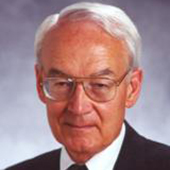Jack H. Wilmore

One of the most influential exercises physiologists in the world during his 37-year career.
IN MEMORIAM
JACK HARRISON WILMORE
Department of Kinesiology and Health Education Distinguished Professor and Professor Emeritus Jack Harrison Wilmore, born April 23 1938, in Ventura, California, passed away on November 15, 2014, in Sun Lakes, Arizona. He is survived by Dottie, his wife of fifty-four years, his three daughters (and their spouses) Wendy, Kristi, and Melissa and seven cherished grandchildren. He is also survived by his two brothers, Jim and Art.
Dr. Wilmore received his B.A. and M.A. in physical education from the University of California, Santa Barbara and his Ph.D. from the University of Oregon in 1966, also in physical education. Over the next forty plus years, he was employed at and blessed eight different institutions with his extraordinary teaching, research, and service; Ithaca College; University of California, Berkley; Preventive Medicine Center, Palo Alto, California; University of California, Davis; University of Arizona; University of Texas at Austin; and Texas A&M University.
Dr. Wilmore served in the UT Austin Department of Kinesiology and Health Education as the Margie Gurley Seay Centennial professor from 1985-1997 and as the department chair from 1990-1991. During his twelve years at UT Austin, he was exceedingly productive. In addition to a full undergraduate and graduate teaching load and graduating six doctoral students, he published seventy-three peer reviewed research articles, thirty book chapters, and five books. His co-authored textbook, Physiology of Sport and Exercise, was revised several times during this time period and is now in its 6th edition. This text remains one of the leading exercise physiology textbooks in the world today. During this time Dr. Wilmore also served on ten editorial boards and the board of four different professional organizations. First, foremost, and always a teacher, he received the 1996 Dean’s Distinguished Faculty Award from the College of Education. During his tenure at UT Austin, Dr. Wilmore was a co-principal investigator for the HERITAGE Family Study, a multi-center, multi-million dollar research grant funded by the National Heart, Lung and Blood Institute of the National Institutes of Health of the U.S. government. The main goal of this highly successful project, which has produced more than one hundred and twenty publications in refereed journals, was to study the role of the genotype in the cardiovascular and metabolic responses to aerobic exercise training and the changes brought about by regular exercise for several cardiovascular disease and diabetes risk factors. Because of his vast and significant contributions to the field, he was inducted into the UT Austin Department of Kinesiology and Health Education’s Hall of Honor in 2008. He was awarded professor emeritus status in 2005.
Dr. Wilmore left UT Austin to become the department head of health and kinesiology at Texas A&M University. He served as department head from 1997-2000 and distinguished professor until his retirement in 2004. Dr. Wilmore is the father
of the Sydney and J.L. Huffine’s Institute for Sports Medicine and Human Performance at Texas A&M. The institute was created with a $2.5 million endowment to facilitate an active interchange of information and research findings among strength and sport conditioning coaches, athletic trainers, health and wellness coordinators, clinicians, sports and clinical physiologists, and rehabilitation specialists.
Distinguished professor at both UT Austin and Texas A&M, and the 1998 Texas Chapter of the American College of Sports Honor Award recipient for his work in Texas, Dr. Wilmore’s contributions went far beyond the 40 Acres, Aggieland, and the state of Texas. Dr. Wilmore was one of the pioneers who led the field of physical education to become more scientific and intellectually rigorous, resulting in our current day kinesiology and exercise programs. He pioneered cutting edge research in numerous areas, including body composition, obesity, female athletes, adult fitness, cardiac rehabilitation, human performance, automation of the measurement of aerobic fitness, and genetics and exercise. He served as president of both the American College of Sports Medicine and the National Academy of Kinesiology. He served as a consultant to six different professional sports teams and the President’s Council on Physical Fitness and Sport. He also served as a member and research chair of the United States Olympic Committee Sports Medicine Council. For these, and many more accomplishments, in 2006 Dr. Wilmore was the forty-fifth person to ever receive the Honor Award, the highest award given by the American College of Sports Medicine, the largest sports medicine and exercise science organization in the world. In 2010, he received the Hetherington Award, the highest award given by the National Academy of Kinesiology. A few of his other awards include the Distinguished Alumni and Athletic Hall of Fame for contributions to sport science from the University of California, Santa Barbara; the C.H. McCloy Lectureship from the American Alliance for Health, Physical Education, Recreation and Dance; International Fellowship, Distinguished Visiting Faculty Fellowship, and the Roby Grey Fellowship, both from The University of Western Australia.
Dr. Wilmore was honored in May 2015 at the 62nd Annual Meeting of the American College of Sports Medicine (ACSM) with a memorial session open to all attendees. Leading figures in the field talked about his many accomplishments, but mostly they spoke of Jack’s personal virtues—his faith, energy, loving heart, optimism, seeing the best in people, sense of humor—that made him not just a great teacher, scientist, and leader, but more importantly an extraordinary husband, father, friend, mentor, colleague, and man. In his honor, Jack’s friends and colleagues have set up the ACSM Jack H. Wilmore Memorial Fund to provide annual assistance to graduate students or young investigators to travel to the Annual Meeting of ACSM to present an accepted paper. Dr. Wilmore, Jack, is sorely missed by family, friends, and colleagues, but his legacy lives on through the lives of the thousands of individuals he inspired and influenced with his teaching, research, writing, and life.
Gregory L. Fenves, President
The University of Texas at Austin

